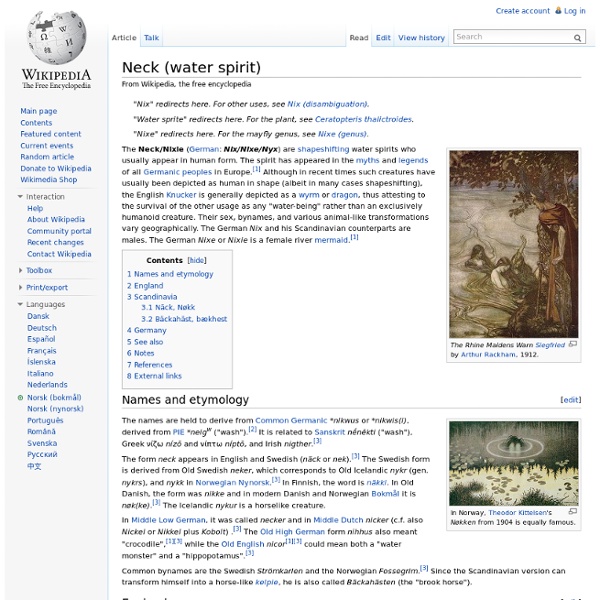Grimm 181: The Nixie in the Pond
Jacob and Wilhelm Grimm Once upon a time there was a miller. He lived contentedly with his wife. They had money and land, and their prosperity increased from year to year. One morning he got up before daybreak and went outside, thinking that the fresh air would lighten his heart. Turning around, he saw a beautiful woman rising slowly out of the water. At first the miller was speechless, but when he heard her speak so kindly, he took heart and told her how he had lived with good fortune and wealth, but that now he was so poor that he did not know what to do. "Be at ease," answered the nixie. "What else can that be," thought the miller, "but a young dog or a young cat," and he promised her what she demanded. The nixie descended into the water again, and consoled and in good spirits he hurried back to his mill. The miller stood there as though he had been struck by lightning. "What good to me are good fortune and prosperity," he added, "if I am to lose my child? "Why are you crying?
Fylgja
In Norse mythology, a fylgja (Old Norse, literally "someone that accompanies,"[1] plural fylgjur) is a spirit who accompanies a person in connection to their fate or fortune. Fylgjur usually appear in the form of an animal or a human and commonly appear during sleep, but the sagas relate that they could appear while a person is awake as well, and that seeing one's fylgja is an omen of one's impending death. However, when fylgjur appear in the form of women, they are then supposedly guardian spirits for people or clans (ættir). Both Andy Orchard and Rudolf Simek note parallels between the concept of the hamingja—a personification of a family's or individual's fortune—and the fylgja.[2] See also[edit] Notes[edit] References[edit]
The Water Nixie
"The Water Nixie" or "The Water-Nix" is a fairy tale collected by the Brothers Grimm, tale number 79.[1] It came from Hanau.[2] It is Aarne-Thompson type 313A, the girl helps the hero flee and revolves about a transformation chase.[3] Others of this type include The Master Maid, Jean, the Soldier, and Eulalie, the Devil's Daughter, The Two Kings' Children, Nix Nought Nothing, and Foundling-Bird. The Grimms noted Sweetheart Roland as an analogue.[2] Synopsis[edit] See also[edit] Farmer Weathersky References[edit] External links[edit] SurLaLune Fairy Tale site The Water-Nix
here to help? bitch, i might be.
The Watersprite (N cken), poem by Erik Johan Stagnelius
The Watersprite (Näcken) By Erik Johan Stagnelius (I - Morion - made the translation from Swedish.) The evening's golden clouds surrounds the vault of heaven the fairies at the meadow dance, and the leaf-crowned Watersprite his fiddle plays in the silvery brook. Little lad among the willows of the shore resting in the vapor of the violet, hear the sound from the spring of water, calling out in the silent night: "Poor old man - why play? Moonlit night of Paradise Eden's fields crowned by flowers angels of light in heaven never you behold them with your eye." Tears run down the old man's face down he dives into the billow the fiddle quiets. Erik Johan Stagnelius Disclaimer: I didn't find any translation of this poem, so I did it myself.
Milkovich Helps
Nixe
Los Neck / Nixie (Inglés) o Nix / Nixe / Nyx (Alemán) son seres fabulosos que habitan en las aguas en varios relatos del folclore europeo. Son espíritus del agua cambia formas, que suelen aparecer en la forma de seres bellos y elegantes, capaces de enamorar a cuanta persona se cruce en su camino. Nixes de la mitología germana[editar] Aunque la imagen sugerente, tierna y lujuriosa de las nixes femeninas es el prototipo de la femme fatale, siempre ataviadas con joyas y ropas elegantes, las nixes son en realidad criaturas desdichadas, lo cual las convierte en vengativas y peligrosas. De acuerdo a las historias, la única forma de reconocer a una nixe, es porque los dobladillos de sus vestidos están siempre húmedos. De acuerdo al folklorista Karl Grün, "El que baila con una nixe se da cuenta enseguida que su ropaje es de una tela muy delicada. El hábitat de las nixes son las aguas estancadas, sean lagunas o estanques, sin embargo frecuentan los pueblos y se unen con los hombres.
Milkovich Helps
Welcome to the Celtic folktales page!
The Celts were a group of tribal societies in ancient Europe who spoke Celtic languages and had similar culture. Present day Celts live in Scotland, Ireland, Wales and small parts of France and England. The collection of Celtic folktales consists of nine books with 249 folktales: 26 Celtic folktales, 128 English folktales, 38 Irish folktales, 33 Scottish folktales and 24 Welsh folktales. Stories of King Arthur's Knights Notes: Contains the legends of king Arthur and his Knights, told to the children by Mary MacGregor. Author: Mary MacGregor Editor: Louey Chisholm Published: Unknown Publisher: T. Irish Fairy Tales Notes: Contains 7 folktales of the Irish people. Author: Edmond Leamy Published: 1906 Publisher: M.A. Myths and Folk Tales of Ireland Notes: Contains 20 Irish folktales. Author: Jeremiah Curtin Published: 1890 Publisher: Sampson Low, Martson, Searle & Rivington, London Fairies and Folk of Ireland Notes: Contains 11 Irish folktales. English Fairy Tales Notes: Contains 43 English folktales.



